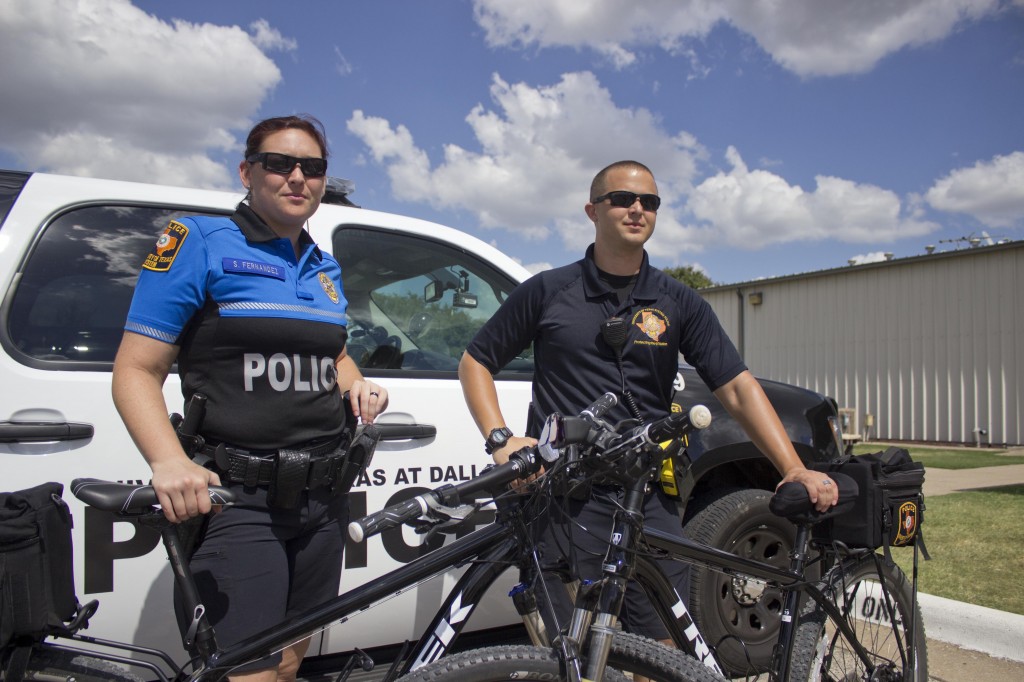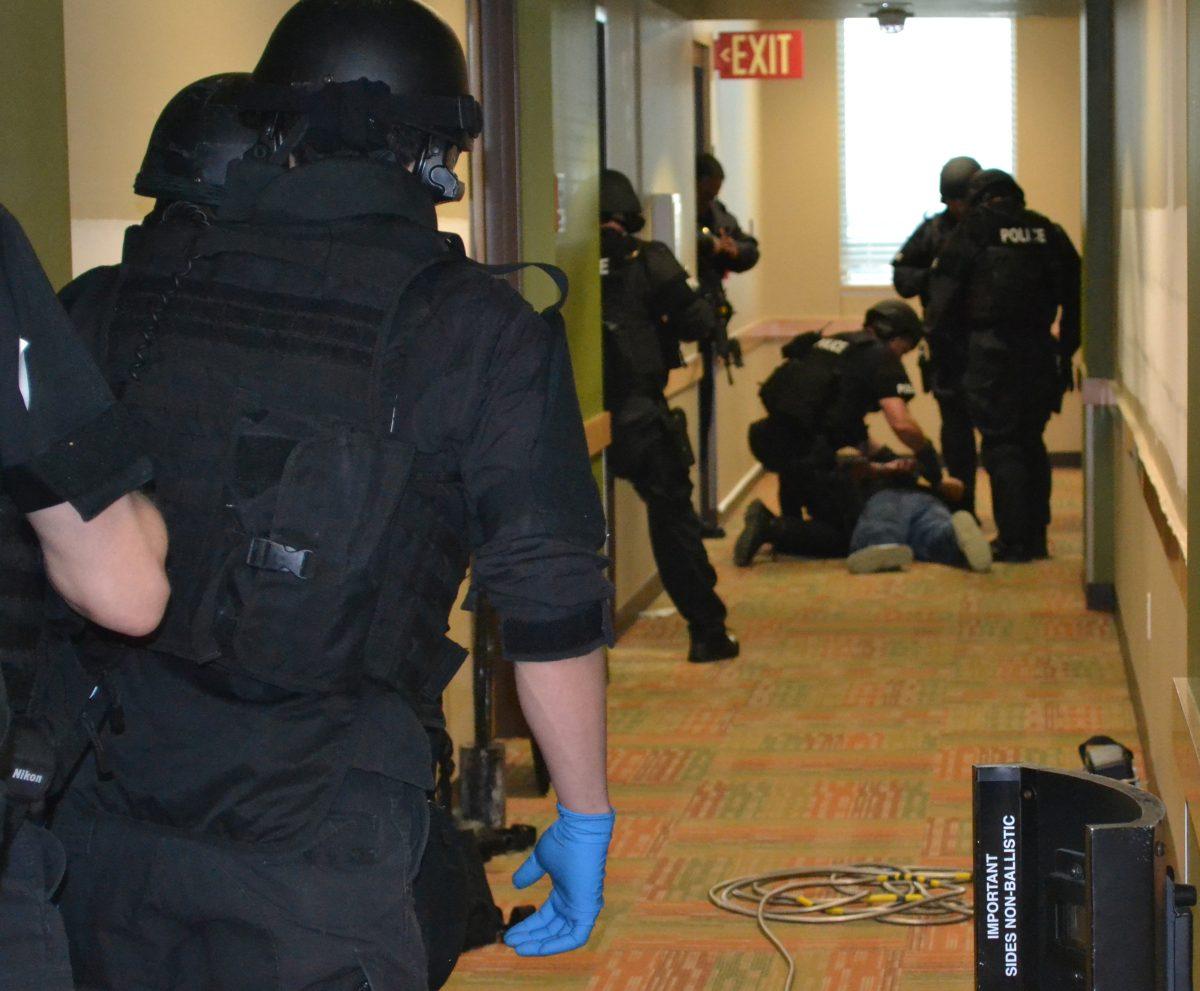Training procedures for campus police amp up academic, physical instruction
However safe and quiet the campus may seem, UTDPD doesn’t deter from staying alert by requiring rigorous and consistent training for its almost two dozen police officers.
Campus police officers are more than just cops. Both new and experienced officers are held to state standards of training and to the UT System training requirements, which means more academic and physical training.
Lt. Ken MacKenzie, head of the criminal investigations division, oversees the hiring of new campus police officers.
“When an interested candidate applies to be a campus police officer, there are a series of detailed steps in the application process that cover everything from the applicant’s financial situation, work habits and physical ability,” MacKenzie said.
This summer, 43 applicants agreed to take the written test to become UTD police officers. Seventeen of those applicants withdrew or failed to show up. Out of the 26 that took the test, 14 failed to achieve a passing grade of 70. Twelve applicants passed and could move on to the next step, which is a preliminary interview.
The interview is comprised of five interviewers, including the chief of police, a lieutenant and a sergeant. This summer, three were disqualified from the interview and nine went on to the physical tests.
The obstacle course measures agility by testing applicants on timed physical tasks, like jumping over a two-foot and a four-foot wall, running quickly around orange traffic cones and dragging a 165 pound dummy in a simulation of saving a life. The ability test includes situations that would be encountered on the job like changing a tire. Out of the nine that showed up for the ability test, all passed.
At this point, those who have passed and have not attended a police academy for the required six months, do so as they are hired by UTDPD.
After an officer successfully completes a police academy, he or she is sent to Austin for four weeks to complete Lateral Academy, a month-long course for UT System-specific rules.
“(UTDPD) can enforce laws that most police departments don’t,” MacKenzie said. “For instance, the Education Code (which) allows us to make contact with any person to see what they are doing on campus. A city police officer has to have probable cause to make contact. It’s for student safety.”
Even experienced police officers that start working for the UT System have to learn these rules, MacKenzie said.
Trey Kiser, a campus officer, has worked on campus for a year and a half. As a new officer, it took him eight months to go through the process of being hired, including going through Lateral Academy.
“Lateral Academy reassures rules like the UT System policy for vehicle pursuits,” Kiser said. “You can only pursue if it’s for a felony. And how we don’t pursue motorcycles.”
After an officer finishes Lateral School, the last step is Field Training Officer, or FTO, where new officers learn the ins and outs of working on campus. Lt. Diane Bartek, head of patrol operations, personally assists new officers in FTO, which can last anywhere from seven to 16 weeks depending on each officer’s training experience.
“FTO includes teaching officers how to write reports, how to work the radio, make traffic stops and how to check contact information,” Bartek said. “That’s all standard. Then, you have the additional learning of the UTD campus orientation and geography.”
FTO is very job related, and the obstacle course is reflective of encounters an officer can have while on duty, Bartek said.
After the completion of FTO, UTD police officers are finished with their training for the year and are able to patrol on their own, equipped to handle problems they encounter while on the job.
Lt. Tim Dorsey, head of the Support Division, said UTDPD doesn’t often encounter problems on campus that it doesn’t have a solution for. Training classes relating to the school are a priority for UTDPD.
Because the international student population makes up about 23 percent of the total student population as of 2013, UTD police officers benefit from understanding how to interact with a variety of cultures on campus.
“In the past, everyone who has worked here has taken a class on multiculturalism,” Dorsey said. “It was very beneficial because it helped us understand culture from all over the world.”
Those who took the multicultural course learned how to overcome language barriers to communicate with people with cultural social norms and body language different from U.S. culture.
Somer Fernandez, a campus officer, said working on a diverse campus can be a simple as respecting each other.
“Working here, you learn as you go,” Fernandez said. “But the most important thing is respect. When you show respect, you often get respect back.”
Other situations call for extra care and understanding, such as people from certain cultures who use the police as a last resort when handling a problem, Dorsey said.
Every two years, police officers are required to complete 40 hours of in-class training. These training classes cover anything from using a Taser, state-and federal-law updates and more specific training experiences. UT System officers also have to requalify for the use of their firearms twice a year through a written test over safety and active shooting.
If an officer failed to complete any part of the required training, that officer would lose his or her license to be a police officer in the state of Texas.
Dorsey said that, to his knowledge, no UTD officer has lost his or her license due to incomplete required training.
Another training exercise conducted by UTDPD in conjunction with the Richardson Police Department was in response training to an active shooter on campus. UTD, being a college campus, is susceptible to situations like these, Dorsey said.
“It was training in a situation where someone with a gun on campus is firing shots, kind of like Virginia Tech, for example,” he said.
UTDPD prepares for the worst in a school that is known for its low criminal activity and high academic rigor not because it has to fulfill state and system requirements, but because it is simply able to.
There are important reasons to take the job as campus officer seriously, but not at the expense of the students, said Kiser.
“We’re here to help,” he said. “We’re not here to harass people, we’re here to keep them safe and make sure they abide by the law.”








